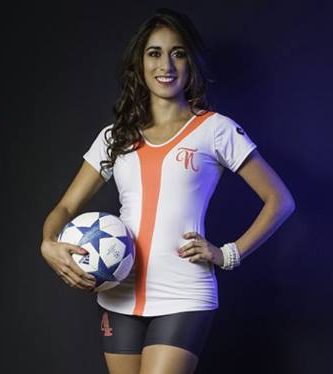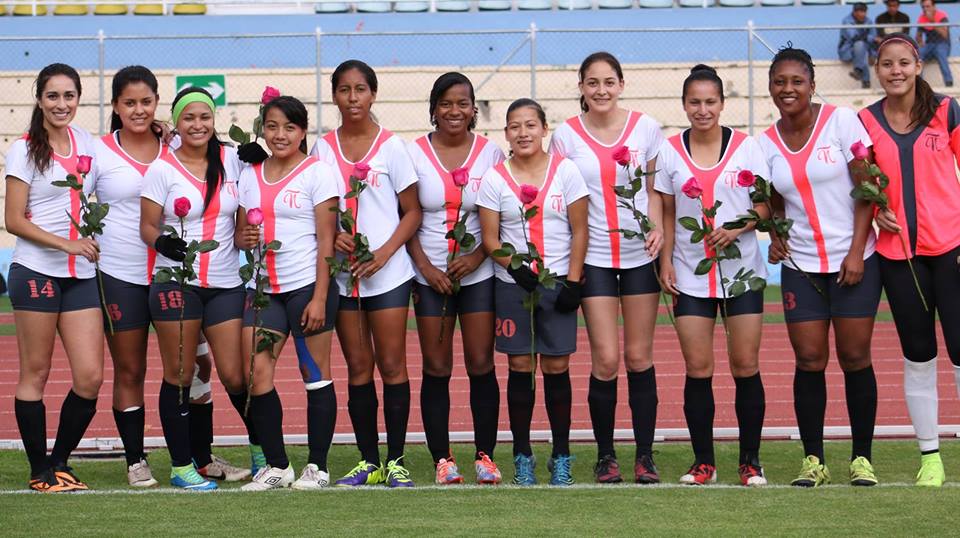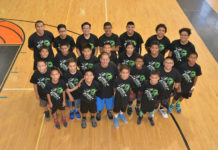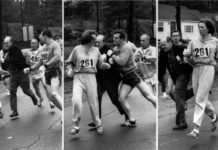In Latin America during the World Cup, soccer fever is so strong that daily life comes to a stop as hoards of people crowd around radios and television sets. On the streets, people play friendly soccer games. But most of those games are made up of men. A sweaty woman running and dribbling a soccer ball while fending off defenders is believed to have rejected her feminine side. Soccer is still seen as a male sport, but a growing women’s team called Las Ñañas in Ecuador is challenging that belief. Fernanda Vásconez, 24, is its founder and captain. She used her 13 years of experience playing soccer for college and professional teams to lead Las Ñañas to the first-level tier in Ecuador’s soccer ranking in just one year. The team has 25 players with ages spanning from 14 to 32, and Vásconez wants to make a second team with the same number of players. The team practices five days a week, plays a game once or twice a week, and is training for their upcoming season. The team is sponsored by companies that support sports and women who want to better their lives. She took a time out from working on the team’s campaign to help street dogs to tell us about the pink-uniformed team.
Fan First: What was it like to aspire to be a soccer player as a little girl in Ecuador?

Fernanda Vásconez: In Ecuador, we’re close to our whole family, especially with our grandparents. They said, “No, Fernandita. You have to study, study, study. You shouldn’t play sports. That’s for men.” But my parents have always supported me. When I was about 11 years old, I used to train three hours a day in rhythmic gymnastics. I competed in national championships. Many universities wanted me when I graduated from school. My parents were very happy. One time, I was training in the Colegio Menor San Francisco de Quito. The women’s soccer team would go there to play and train. I was in the middle of my routine and I started watching them just moments before they scored a goal. And I watched them as they celebrated, how they were happy, how they shouted. I couldn’t look away, I loved it. My trainer asked me what was wrong and I said, “I’m sorry. I just found the sport I want to play for the rest of my life.” I went home and told my parents that I wanted to play soccer. They didn’t believe me. I started playing soccer around that time and played mostly with boys. Even though I also played basketball and volleyball, I was always around soccer.
FF: How does playing soccer differ in Ecuador if you’re a boy or a girl?
Vásconez: There’s a lot of money for men’s championships and very little for women’s championships. Women started playing at a level that’s semi-professional three years ago. We call it semi-professional because it’s set by all the entities that are professional. Nevertheless, players don’t get paid because the teams simply don’t have the money. Many of our players have jobs. That’s why we have practices at night. We encourage them to work, study, and play sports. We want them to fulfill every part of their lives and to be with their families.
There aren’t enough people who know about women’s soccer. But that’s just a matter of time. It all comes back to how much money women’s and men’s soccer can produce. For people to start supporting women’s soccer, it’s essential that the media gets information about us to the rest of Ecuador and the rest of the world.
FF: Have any of your players struggled because soccer is seen as a male sport?
Vásconez: We had a girl who loved soccer so much that she would start trembling when she talked about it. She was so shy. She couldn’t speak to a person without blushing. She would say that soccer was the best thing that ever happened to her. But she started missing practice and said that her mom wouldn’t let her play. Her mom said that soccer was for men, that her daughter wouldn’t have any friends. She used to play when she was about five years old, but her mother would punish her for it. She stopped playing until she was 16 and then came with her father. He loved soccer and he approved of women playing. And then one day it was too much for her mom so she had to stop.
FF: Has the perception of female soccer players changed?
Vásconez: We’ve been told that we have changed and revolutionized the way people see soccer. People used to believe that soccer is for men and that girls who play soccer want to resemble a man, and that’s not true.
FF: What do you do to counteract that perception?
Vásconez: We’re the only team with uniforms made by a well-known designer who specializes in feminine clothes. That’s why the uniforms are very girly. We use pink to break that stereotype and show that girls can be girls. You can be whatever you want to be, doing whatever you want to do. I can play soccer, and I can put makeup on. That doesn’t change who I am. But there are still some negative comments. We appeared on a national channel once, and someone commented on the channel’s Facebook page, “What are girls doing there? They should be cooking.” It was offensive.
FF: What was your proudest moment as a player?
Vásconez: In my first game with the national team, we played in Brazil. I wore the team’s shirt, then the national anthem started playing and I could see the crowd. I put my hand on my heart and said, “Right now, I’m representing 13 million people.” I thought it was really amazing, and I promised myself that I would give everything because the opportunity was unique. I knew the responsibility of being there in that moment.
FF: How has your role changed since you started this program?
Vásconez: I’m responsible for a lot of girls here. They’re national players and they’re so good at this sport, but some are very poor. If they didn’t play soccer, they might be in the streets. We give them an education, and we pay for their school and everything they need. We also blend sports with whatever they need in their life. We teach them how to speak in public and how to present themselves during an interview because they don’t learn that in every school. Normally, marriage is the end of the soccer career for girls. We have to prepare them for that. The girls are also role models for hundreds of children in Ecuador. We work a lot with Isabel Lasso, our sports psychologist.

FF: Do you think Lasso’s role is especially important for this team?
Vásconez: Her role is important because we’re changing the way people think about female soccer players. Sometimes it’s not accepted or well-known. The girls have the pressure of being a professional athlete, balancing their education, and the pressure of being away from their families. They even get pressure for being different from most girls, so they need help with that. We want to break some mental barriers.
FF: How does training with Las Ñañas differ from Switzerland?
Vásconez: Switzerland has had professional soccer for about 15 years, and we’re just starting to develop it in Ecuador. There are also a lot of aspects of the culture that you can see in any country you play for. In Ecuador, we pray to God in every training because we’re very religious. But what matters is how much you can put into the team, your personality, and your soccer level. There are girls in Switzerland who have been playing in schools that specialize in women’s soccer since they were about nine years old. Some of the girls in Ecuador started playing when they were 19. Trainers here have to take girls in different categories, soccer levels, and techniques and try to get everyone on the same level.
FF: What cultural norms or rules inform how soccer is played and experienced in Latin America?
Vásconez: Latinos are very sentimental and passionate. When we lose a game, we cry, and when we win, we want to party. I think that’s the high expectation in our team and in women’s soccer teams here. It’s not professional, so the players aren’t getting paid and they do it because they love it. During trainings, we laugh, train hard, and try to help in every way that we can.
FF: Does Las Ñañas get support from other teams?
Vásconez: No. We’re the newest professional soccer team in Ecuador, but we support others because we’re one of the highest-ranked teams. Our organization is bigger than most. We have more fans and better media exposure, so they feel they’re below us. They ask for help and not the other way around. People get used to being helped and forget to help others. My parents taught me that it’s best to be the one who’s helping if you’re waiting for the help to come. Our trainers are the best in Latin America so they give talks and speeches to other trainers who come to Ecuador.
FF: What are some goals that the team would like to achieve?
Vásconez: In 10 years, we want to have one house for the trainers and one for the players. We see it as a necessity because they can’t find schools that fit their schedules because they’re going to miss many classes, and nobody is guiding them. We also want our own stadium. We have very high goals. But having a soccer team was a high goal and we already have that.








